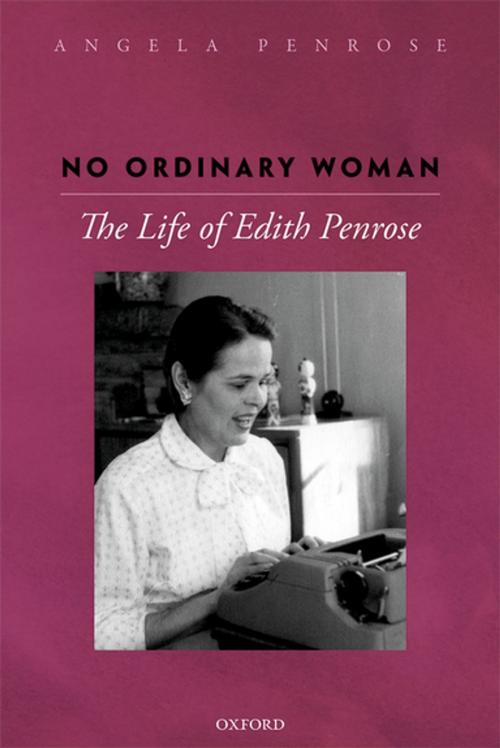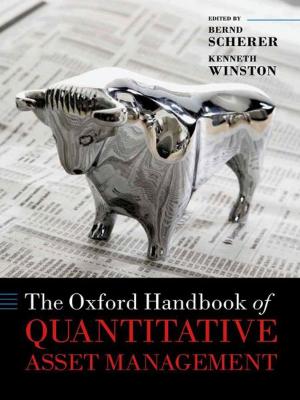No Ordinary Woman
The Life of Edith Penrose
Business & Finance, Career Planning & Job Hunting, Entrepreneurship, Entrepreneurship & Small Business| Author: | Angela Penrose | ISBN: | 9780192537751 |
| Publisher: | OUP Oxford | Publication: | October 20, 2017 |
| Imprint: | OUP Oxford | Language: | English |
| Author: | Angela Penrose |
| ISBN: | 9780192537751 |
| Publisher: | OUP Oxford |
| Publication: | October 20, 2017 |
| Imprint: | OUP Oxford |
| Language: | English |
Edith Penrose was a remarkable woman and distinguished scholar who lived through, and witnessed at first hand, many of the major events of the 20th century; the great depression in the US; the rise of Nazism in Europe; the second world war when she worked as a special adviser to the US Ambassador in London; post-war reconstruction, assisting Eleanor Roosevelt with the drafting of the Universal Declaration of Human Rights; the McCarthy era; and the oil crisis of the 1970s. Her work as an economist made a mark in several distinct but overlapping areas - on the patent system, on the theory of the firm, on multinational enterprises, the oil industry, and the economics of the Middle East. Her best known work, The Theory of the Growth of the Firm was originally published in 1959, and has formed the basis of the current dominant perspective in strategic management, the resource based view of the firm. Edith Penrose's approach to explaining the nature of the firm, her fundamental insights, and the concepts she developed are still being applied and extended to new fields of enquiry. Her reformulation of the theory of the firm has had a major influence on the study of the business enterprise, and some argue, the economy itself. She had a distinguished academic and public service career, and wrote extensively on the understanding of the interface between the strategies and activities of multinational enterprises (MNEs) and the nation states;particularly the developing countries—in which they operated. This is the first biography of Edith Penrose, drawing on unpublished diaries and letters, the personal memories of her family, friends, and colleagues, and describes her eventful life, her extensive output and influence. The book tells her personal and professional story, weaving it through the extraordinary upheavals of the twentieth century in which she played a part. The book builds up a picture of a vital, energetic woman who lived life to the full, defied convention, made an impression on all who met her and left a significant intellectual legacy.
Edith Penrose was a remarkable woman and distinguished scholar who lived through, and witnessed at first hand, many of the major events of the 20th century; the great depression in the US; the rise of Nazism in Europe; the second world war when she worked as a special adviser to the US Ambassador in London; post-war reconstruction, assisting Eleanor Roosevelt with the drafting of the Universal Declaration of Human Rights; the McCarthy era; and the oil crisis of the 1970s. Her work as an economist made a mark in several distinct but overlapping areas - on the patent system, on the theory of the firm, on multinational enterprises, the oil industry, and the economics of the Middle East. Her best known work, The Theory of the Growth of the Firm was originally published in 1959, and has formed the basis of the current dominant perspective in strategic management, the resource based view of the firm. Edith Penrose's approach to explaining the nature of the firm, her fundamental insights, and the concepts she developed are still being applied and extended to new fields of enquiry. Her reformulation of the theory of the firm has had a major influence on the study of the business enterprise, and some argue, the economy itself. She had a distinguished academic and public service career, and wrote extensively on the understanding of the interface between the strategies and activities of multinational enterprises (MNEs) and the nation states;particularly the developing countries—in which they operated. This is the first biography of Edith Penrose, drawing on unpublished diaries and letters, the personal memories of her family, friends, and colleagues, and describes her eventful life, her extensive output and influence. The book tells her personal and professional story, weaving it through the extraordinary upheavals of the twentieth century in which she played a part. The book builds up a picture of a vital, energetic woman who lived life to the full, defied convention, made an impression on all who met her and left a significant intellectual legacy.















